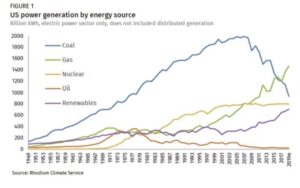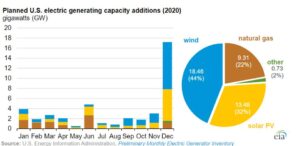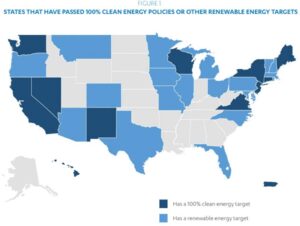How is that Commodore 64 working out for ya? The pace of technology change is very fast; last years problems are resolved this year and will get much better two years from now. Apparently this is news to many electric vehicle critics who use old data to promote their own anti-EV agenda’s with superficially scientific claims.
A few days ago a “why can’t I buy a V12 pickup truck” friend, sent us this sciencey looking video which claims that electric vehicles are really terrible for the environment. The problem with the slick graphic analysis is that it is just simply inaccurate.
We have seen enough of these types of videos and conversations that we decided to take up the issue and BRIEFLY explain exactly why these criticisms of EV’s are wrong. EV facts are fast moving and they are only going in one way, better. So there is no point in getting hung up on precise numbers.
Here is the video version of this page, which you may find easier that read:
Those of you who have read PartisanIssues will know that I am not a zealot about EV’s; they have lots of issues but negatively effecting the environmental impacts isn’t one of them. So lets go through the claims one by one.
- Producing Electric Cars & Batteries Creates 55% More CO2 Than Gas Powered Cars: That was the case back in the early 2000, but again, technology advances relentlessly. In 2020 the manufacture of a regular gas powered car makes about 6500 pounds of CO2 while an EV makes about 9000. Not great, but BOTH gas powered and electric powered vehicle production is getting so much greener.

- Lithium Mining is Horrible: Yup, lithium mining has been a messy business. Lithium has mostly been produced by either burning out of rock (yes, burning rock!) using a vast amount of fossil fuels or by destroying water tables in enormous evaporating ponds in third world countries. However, like all technlogy in a free market there is enormous regulatory and competitive pressure to improve efficiency. Today, new hard rock lithium mines like Fronteir Lithiums Sudburry Ontario operations are using more efficient extraction processes and Geothermal Lithium (aka Green Lithium produced naturally) has become economic. We have a complete write up on lithium extraction here if you want the details.
. - Electric Cars are Just Coal Powered Cars: Again, this was accurate in the 2000’s but in 2020 that is just a fiction propagated by those with an agenda. There are just so many things wrong with this statement it is difficult to organize them, but let me narrow it to just two to avoid rambling on:
- Nearly every country in the world is massively increasing their use of natural gas, solar and wind power, including the US, UK, France, Canada, Germany and even China. As you can see in the two graphics below coal fired electricity generation in the United States has collapsed over the last decade and the near future is only enhancing the trend:
Notice that the serious decline of coal in the United states started in the late 2000’s and contrary to popular myth accelerated under the former President Trump. This is not because coal was pushed down by regulation but because renewables and natural gas technologies became substantially cheaper than coal.
. - In my case, I get my electricity from the Calgary power grid which is 86% natural gas and 14% wind powered and has been since 2016!. That is unless I source the electricity from my solar panels which about of third of EV owners have today and more will have tomorrow:

- Nearly every country in the world is massively increasing their use of natural gas, solar and wind power, including the US, UK, France, Canada, Germany and even China. As you can see in the two graphics below coal fired electricity generation in the United States has collapsed over the last decade and the near future is only enhancing the trend:
Are Gas Powered Vehicles Better For The Environment Than Electric Vehicles?
Beyond the analysis above that shows how much better EV’s are, there is more to consider. Built into nearly all of the critisims of EV’s are two assumptions:
- EV’s have the same life span as gas powered vehicles
- EV’s become garbage when their batteries get old
Both of these assumptions are fundamentally wrong.
Because EV’s have 30% fewer parts and a wildly simplified powertrain (battery, electric motors and tires) there is very little to brake on them and they will last much longer than traditional internal combustion engine vehicles. We have not had EV’s long enough to make a definitive statement but our best guess is that EV’s will be on the road twice as long as gas powered cars.
When an electric vehicle battery won’t charge to more than about 70% of its capacity due to age the battery is replaced by the manufacturer. However, Ford, GM, Tesla, Mercedes and others are not stupid. They are not going to put those batteries in landfills. Used EV batteries are simply repurposed. They are asset… a valueable asset. EV batteries are so reliable that there have been precious few of them to repurpose but that will change:
“…California is the largest market for EVs in the US and by 2027, an estimated 45,000 EV batteries will be retired from the state. Assuming a conservative capacity for each of these batteries (25 kWh), this amounts to over 1 GWh/year of available storage in the Golden State. … After 8 to 12 years in a vehicle, the lithium batteries used in EVs are likely to retain more than two thirds of their usable energy storage. ” SOURCE
When there is a supply of used EV batteries they will be used for home storage, utility scale electricity storage and datacenter backups. And even when those repurposed uses are exhausted, these large batteries will not fill our dumps, they will be harvested for metals and materials, then built into new batteries.
ICE vs EV Cumulative Greenhouse Gas Emissions
To put help put a cap on this topic, below is a solid, modern analsys of a real cars showing that in 2020 EV’s are carbon competitive with gas powered vehicles in just two years. By the 10th year of life an gas car will produce 70% more GHG’s than an EV. EV’s should last nearly 20 years on the road and have their batteries repurposed to other GHG saving and convenience making uses.
What Else is Better About EV’s?
We can go on and on about other benefits of electric cars like:
- How much CO2 gas stations and the tanker trucks the fill them up create
- How the total cost of ownership over 5 years is actually substantially less expensive
- You are only short of gas when you are in a hurry and EV’s are always charged
- Most EV’s have next generation cool tech in them
- Not having to schedule, line up, wait and pay for oil changes
- How much CO2 and other polution is created drive to, from and waiting in line as gas stations
- Not having to fill up the tank every week means not freezing your hands off in the winter
- Having virtually zero standard maintenance
- Having your car pre-heated or cooled before you get into it (try to run a gas engine in your garage and see what happens)
- The crazy acceleration of an electric drive
- Never… ever… having to replace your brakes
- Not having to waste time and money letting the engine warm up
- Ellimination of idleing polution
- How much fun an EV is to drive
- …
The bottom line is that electric vehicles are just a better, cheaper technology which just so happens to be better for the planet too.







0 Comments